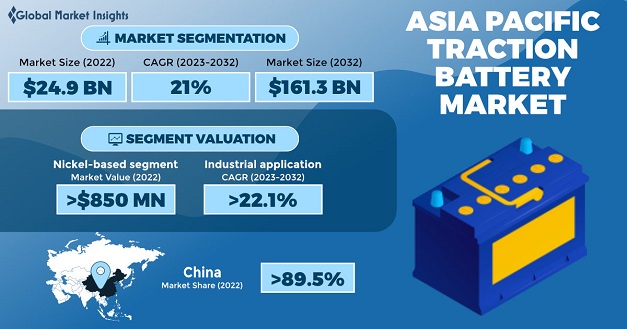Home > Energy & Power > Battery Technology > Traction Battery > Asia Pacific Traction Battery Market
Asia Pacific Traction Battery Market Size
- Report ID: GMI7369
- Published Date: Nov 2023
- Report Format: PDF
Asia Pacific Traction Battery Market Size
Asia Pacific Traction Battery Market was valued at USD 24.9 billion in 2022 and is set to observe more than 21% CAGR between 2023 and 2032, attributed to the increasing awareness of environmental sustainability and a heightened emphasis on infrastructure development, accompanied by a surge in Foreign Direct Investment (FDI). In 2021, Japan and China collectively dominated the market, accounting for more than 95% of the market share in the region. Furthermore, faster Adoption and Manufacturing of Hybrid and Electric Vehicles (FAME) scheme, which is expected to have a positive impact on the growth of traction batteries.
The growing shift toward electrifying the transportation sector is driving an increased demand for traction batteries. These batteries are not only environmentally friendly but also highly recyclable, which promotes their widespread adoption. Various industries are emphasizing the integration of battery electric or hybrid models in their industrial vehicles, such as forklifts and excavators. Additionally, government laws and regulations aimed at encouraging the production and sale of industrial electric vehicles to reduce emissions at manufacturing and processing sites are expected to have a positive impact on market.
| Report Attribute | Details |
|---|---|
| Base Year: | 2022 |
| Asia Pacific Traction Battery Market Size in 2022: | USD 24.9 Billion |
| Forecast Period: | 2023 to 2032 |
| Forecast Period 2023 to 2032 CAGR: | 21% |
| 2032 Value Projection: | USD 161.3 Billion |
| Historical Data for: | 2019 to 2022 |
| No. of Pages: | 150 |
| Tables, Charts & Figures: | 248 |
| Segments covered: | Chemistry, Application |
| Growth Drivers: |
|
| Pitfalls & Challenges: |
|
Lead-acid batteries pose safety concerns due to their surplus of lead and sulfuric acid. The corrosive nature of the acid makes it a carrier for soluble lead and lead particulates, resulting in several countries categorizing lead-acid batteries as hazardous materials. Improper handling of these batteries can pose health hazards, as excessive lead exposure can lead to kidney and brain damage, hearing impairment, and various other associated health issues. Therefore, it is imperative to ensure the appropriate collection and environmentally friendly recycling of lead-acid batteries once they reach the end of their operational life.

